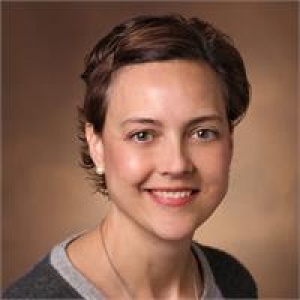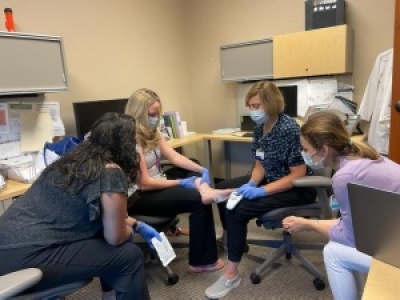
As a women’s health nurse practitioner specializing in the surgical sub-specialty of female pelvic medicine, I provide much of the non-surgical, conservative treatments to patients experiencing the quality-of-life (QoL) impacting problems that stem from pelvic floor dysfunction (PFD). Women with PFD may experience urinary incontinence, fecal incontinence, pelvic organ prolapse, and pelvic floor muscle pain, issues which may create extremely burdensome symptoms that deny many women the experience to engage in their communities with family and friends. I have the privilege of working very closely with some fantastic surgeons and nurses and we believe it is our team-based mindset that enables use to provide thoughtful and dedicated care for our patients.
PFD can affect a woman at any stage of her life, not just as she ages or transitions into the menopause. Childbearing, family history, lifestyle, and environmental factors may all contribute to the symptoms experienced. Yes, we are a surgical specialty, but given the QoL impacting nature of the disorder, we offer women options and choice in their care. Since I manage many of the non-surgical choices, my role primarily lies in the outpatient setting where I provide pessary fitting and surveillance, percutaneous tibial nerve stimulation (PTNS), medication management, and much of the postoperative care for our surgical patients. I also perform some of the diagnostic procedures, such as urodynamic testing, that help us gain greater clarity on urinary dysfunction. We are fortunate to have a robust pelvic floor physical therapy program at VUMC as well as our in middle-TN region, as PT can be a vital treatment for PFD. I initiate many referrals to our PT colleagues so patients may benefit from this treatment.
I have been a WHNP for over 20 years and I have watched our specialty grow to have more sub-specialty career choices, much like our MD colleagues. However, we, unfortunately, continue to gain much of our training and experience on the job and this has created challenges for the NPs who wish to sub-specialize. It is my hope that our profession will continue to be creative and innovative to drive excellence in education and care so we can meet the instructional challenges for our students and NP colleagues.
These educational challenges serve as much of the reason I chose to dedicate much of my career to the academic setting where I can provide some of that training to the next generation. I feel most proud of the impact I can make on the learners who come into my clinic. I have also been very fortunate to be active in my specialty’s nursing organization, the Society of Urologic Nurses and Associates (SUNA). By providing leadership for the organization as well as numerous educational lectures and workshops to newly specializing WHNPs, PAs, and nurses, I have been able to further contribute to education. This effort has not only allowed me the opportunity to educate my colleagues, but I have also learned a great deal along the way. I believe the ultimate benefactors to our greater expertise are our patients who deserve to have the best care and see us all put our best foot forward.
When not at work, I enjoy time with my family. You may find me and my husband working in the yard and garden or on a soccer field cheering on our kids. When not doing those things, we like to steel away to the plateau to our family’s farm. This affords us some vital time away from the hustle and bustle and maybe catch up on a good mystery.